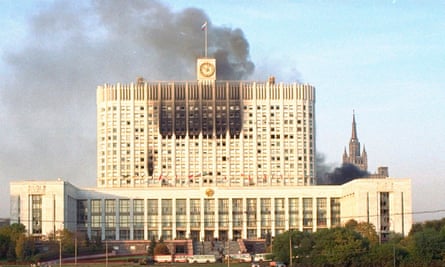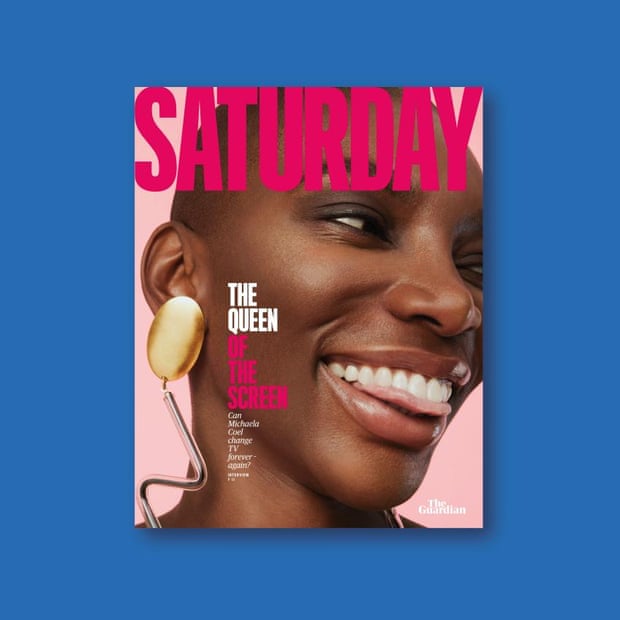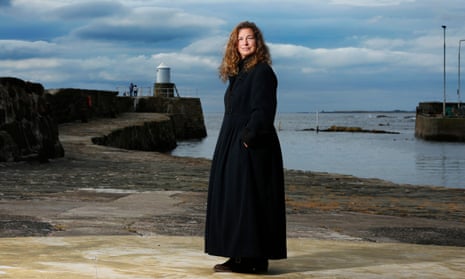The third of October 1993 was a beautiful day in Moscow. The sky was blue, the streets were busy and the air was chilly. I was a US paralegal living my best 23-year-old life, with a head full of dreams and a job at an international law firm.
I grew up in New Jersey, then rural Pennsylvania. At university I did politics and Russian studies, and took a class in US and Soviet relations. I was fascinated by these two countries at odds.
In 1991, I spent a term in St Petersburg to learn the language. I fell in love with Russian life and went to live in Moscow when I graduated. I rented a flat near the Russian White House. Moscow then was like the wild west: there was a lot of money to be made. Politically, it was on the verge of a constitutional crisis.
That sunny October evening, there was an air of unrest. Parliamentarians had blockaded themselves inside the White House, which houses the government, in an attempt to overthrow President Yeltsin. That night, the public stormed the national television centre and the station went off air. Russia was on the brink of a coup. I phoned my parents telling them not to worry.
The next morning, transport was down. My boss lived in my building, opposite the US embassy. He called from the office, asking me to check on his wife and kids. I went over, then stayed for pancakes. Afterwards, their 16-year-old son, John, walked me back.
He told me about the great view of parliament from the roof, so we climbed up. Other young people were there, too. Then we looked down. The road below was lined with tanks that were beginning to roll out. Troops flooded the streets and machine guns blasted the White House. The roof started shaking. I was scared. Then I was shot. Twice. In my leg and abdomen.
I couldn’t feel pain, just the need to survive. The shooting continued as I dragged myself to the fire escape. I got halfway down before my body gave up. John helped me, and neighbours carried me into his apartment to wait for an ambulance. I only remember chaos. Later I found out the buildings around us were full of snipers.

Three weeks before I was shot, my mom had flown from the US to visit me. When she returned, two days after the shooting, my condition was so critical that she was told to drive straight to the hospital if she wanted to see me alive.
I’d undergone surgery, and lost litres of blood. The doctor and nurse had given me their own as they operated. Everyone at my law firm had donated too, but it wasn’t enough. Hospitals were dirty, with poor standards (unless you were a diplomat), so I’d picked up a life-threatening infection.
I needed to get to a western-standard hospital to survive. With my mom, I was put on a tiny plane to Helsinki, Finland. The medics did CPR for the entire 90-minute flight.
By the time I arrived, my lungs were full of blood. The doctors discovered I also had liver damage and no longer had a right kidney or gall bladder. They operated again, and I stayed in Finland for 10 days. Before I left, a phone call came through from President Clinton. He had heard what had happened and wished me well. I was on so much morphine, I barely remember it.
I was flown home to the US, where I spent two months in hospital. As soon as I was fit to fly, I returned to Moscow; I was determined that some random sniper wouldn’t derail this great life I’d made. I stayed for six more years.
Sometimes my story comes up at dinner parties, but I often forget about it. I have a scar from my stomach to my back, but I’ve never dreamed about what happened; it doesn’t haunt me. The shooter was never identified. I believe it was random, but there were too many people – army and civilians – firing weapons that day to know.
Two years later, I was working for a human rights organisation when President Clinton visited. He gave me a two-handed handshake and told me it was good to see me well.
Quick GuideSaturday magazine
Show

This article comes from Saturday, the new print magazine from the Guardian which combines the best features, culture, lifestyle and travel writing in one beautiful package. Available now in the UK and ROI.
I live in Fife, Scotland, now, but found myself in Russia on the 20th anniversary of the siege. Hearing commemorations to the hundreds who were killed or injured made me reflect. I have often been told I have a Russian soul. Sometimes, I ask myself if what I’m doing in life justifies this incredible thing that I survived. But really, it was just a moment in time when I collided with a piece of history.
As told to Deborah Linton
Do you have an experience to share? Email experience@theguardian.com
